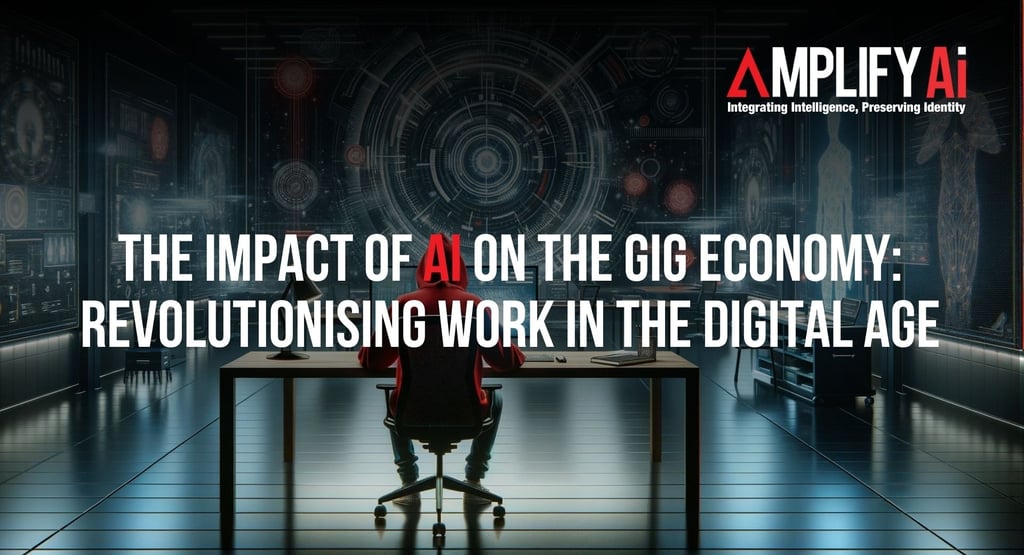The Impact of AI on the Gig Economy: Revolutionising Work in the Digital Age
Ronsley Vaz
4 min read


In today's fast-paced world, the gig economy has gained significant traction, offering flexible work opportunities and the ability to work on demand. With the rise of Artificial Intelligence (AI) technology, the gig economy is undergoing a profound transformation. AI is revolutionising freelancers, solopreneurs, and businesses, providing new opportunities, increasing efficiency, automating tasks, and potentially disrupting traditional employment models. In this article, we will explore the impact of AI on the gig economy, discussing its benefits, challenges, and implications for the future of work.
The Gig Economy and AI: A Perfect Match
Before delving into the impact of AI on the gig economy, it's important to understand the concept of the gig economy itself. The gig economy refers to a labour market characterised by short-term contracts or freelance work instead of permanent jobs. It allows individuals to choose their work hours, projects, and clients. AI technology, on the other hand, encompasses computer systems that can perform tasks that typically require human intelligence, such as speech recognition, decision-making, and problem-solving.
Benefits of AI in the Gig Economy
One of the significant benefits of AI in the gig economy is the increased efficiency it brings to freelancers and solopreneurs. AI-powered tools can automate repetitive tasks, allowing gig workers to focus on more complex and high-value activities. For example, a freelance graphic designer can use AI-generated templates to quickly create designs, saving time and effort.
AI also offers enhanced data analysis and insights, enabling gig workers to make data-driven decisions. By analysing large datasets, AI algorithms can identify patterns, trends, and customer preferences, helping freelancers optimise their work and deliver better results. AI can provide recommendations for improved project outcomes, suggesting potential strategies or adjustments based on historical data.
Furthermore, AI enables gig workers to collaborate on projects more effectively. AI-powered platforms can match freelancers with suitable projects based on their skills, experience, and preferences. This expands earning potential by connecting freelancers with projects they may have yet to discover.
Challenges of Implementing AI in Gig Work
While the benefits of AI in the gig economy are evident, some challenges need to be addressed. One challenge is the need for specialised knowledge and skills to effectively utilise AI technology. Freelancers and solopreneurs must invest time in learning and adapting to AI tools and platforms. This requires a willingness to embrace new technologies and continuously update their skill sets.
Another challenge is the ethical considerations surrounding the use of AI in gig work. As AI becomes more prevalent, questions arise about the potential impact on job security and the displacement of human workers. Freelancers may face competition from AI-powered systems that can perform tasks at a lower cost or with greater efficiency. Striking a balance between AI and human involvement is crucial to ensure equitable work opportunities and fair compensation.
AI's Impact on Freelancers and Solopreneurs
AI technology can support and enhance freelancers' and solopreneurs' work in various ways. For instance, AI-powered virtual assistants can help manage administrative tasks, schedule appointments, and handle customer inquiries, freeing up time for gig workers to focus on their core competencies. AI can also assist in content creation by generating article outlines, offering topic suggestions, and even providing grammar and style corrections.
Furthermore, AI streamlines workflows and reduces manual effort. For example, an AI-powered project management tool can automate task assignments, track progress, and provide reminders, ensuring projects are completed efficiently. This increased efficiency allows freelancers to take on more projects and increase their earning potential.
Additionally, AI facilitates remote work and collaboration. With AI-powered communication tools, gig workers can seamlessly connect with clients and team members regardless of geographical distance. Video conferencing, project management software, and collaboration platforms enable real-time communication and file sharing, making remote work as efficient as traditional office setups.
Disruption and Innovation in Employment Models
AI's impact on the gig economy extends beyond individual freelancers and solopreneurs. It has the potential to disrupt traditional employment models and pave the way for new and innovative forms of work. As AI technology advances, businesses may increasingly rely on gig workers and AI-powered systems to complete projects, reducing the reliance on traditional employment structures.
This shift towards a more flexible and project-based work environment can benefit greatly. Businesses can tap into a global talent pool, accessing specialised skills and expertise from anywhere. Gig workers, in turn, can choose projects that align with their interests and skills, creating a more fulfilling and autonomous work experience.
AI's Role in Remote Work and Collaboration
AI technology plays a crucial role in enabling effective remote work and collaboration. With the COVID-19 pandemic accelerating the adoption of remote work, AI-powered tools have become essential for maintaining productivity and communication. Virtual meeting platforms, chatbots, and collaborative project management software have become the backbone of remote work setups.
AI-powered tools not only enable effective communication but also help overcome geographical barriers. Language translation tools, for instance, enable seamless communication between freelancers and clients from different countries, breaking down language barriers and expanding opportunities for global collaboration.
AI technology is revolutionising the gig economy, offering numerous benefits and challenges. It enhances efficiency, automates tasks, and provides valuable insights, empowering freelancers and solopreneurs to thrive in the digital age. However, the successful integration of AI in gig work requires continuous learning and adaptation, along with ethical considerations, to ensure fair and equitable opportunities.
As AI continues to advance, gig workers, businesses, and policymakers must embrace its potential while addressing the challenges it presents. By leveraging the power of AI, freelancers and solopreneurs can unlock new opportunities for growth, efficiency, and success in the ever-evolving gig economy. The future of work is here, and AI is playing a vital role in shaping it.

Subscribe to the podcast
Subscribe now to "Amplify Ai" and let's set sail together on this exciting voyage towards business growth and success.



